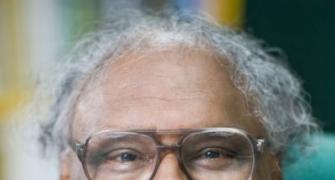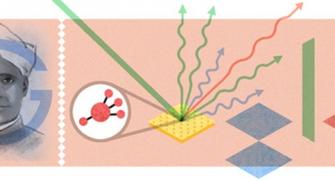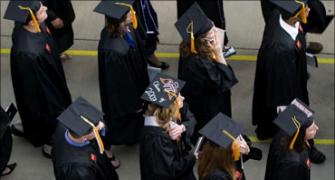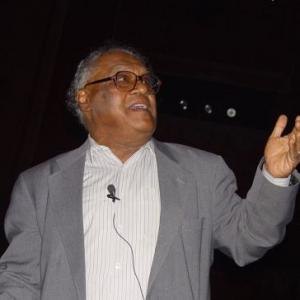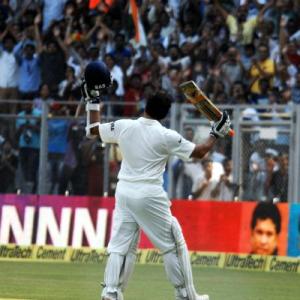Research and teaching have remained Professor Chintamani Nagesa Ramachandra Rao’s first priority and love, and that is what sets him apart, says Dinesh C Sharma
 The selection of Professor Chintamani Nagesa Ramachandra Rao for the highest civilian honour -- Bharat Ratna -- comes as a long overdue recognition for Indian science.
The selection of Professor Chintamani Nagesa Ramachandra Rao for the highest civilian honour -- Bharat Ratna -- comes as a long overdue recognition for Indian science.
It is only the second time that the Bharat Ratna has been bestowed upon a scientist engaged in pure scientific research. Nobel Laureate and Physicist Sir C V Raman was the first to receive it in 1954 -- the year the Bharat Ratna was instituted.
Defence engineer and technologist Dr A P J Kalam was given the Bharat Ratna in 1997, but by then he had given up active research work and was holding an administrative position (secretary, Department of Defence Research and Development) in Delhi.
What sets Prof Rao apart from his contemporaries is his constant focus on basic research in his chosen fields -- physical and structural chemistry, and material science. It is not as if he has not taken up larger roles for Indian science or national projects, but research and teaching have remained his first priority and first love. He chose to stay away from the temptation of becoming a science-bureaucrat in Delhi like many other scientists.
Even when he was the director of the Indian Institute of Science and the scientific advisor to prime minister Rajiv Gandhi in the 1980s, he constantly remained in touch with research.
Now he heads the Scientific Advisory Committee to the prime minister but prefers to maintain a low profile. The panel quietly does its work. It is a different matter that it does not make headlines. Only last week, the panel proposed a slew of measures to promote science education, research and innovation in the country.
‘Eliminate bureaucracy and outdated procedures that dominate the management of education, science and technology today so that these sectors are freed from serious impediments’, the council has recommended. In addition, ‘governance reforms are badly needed in our universities, especially state universities which carry the excessive burden of affiliated colleges’. It is not just the question of increasing investment in science and technology, ‘but also the moral and intellectual support of society as a whole to science, technology and innovation’.
By any measure, Prof Rao is easily the most decorated and awarded scientist in India, having won some of the most coveted international scientific awards and having been given honorary doctorates by as many as 60 foreign and Indian universities. He has also headed important scientific academies including the Indian National Science Academy and the Third World Science Academy.
The Bharat Ratna to him comes as the icing on the cake. In fact, when the first demand of giving the highest honour to Sachin Tendulkar had surfaced in December 2011, Prof Rao had expressed some strong feelings. He had observed that while it was all right for cricket fans to talk about conferring the Bharat Ratna on their icon, Homi Bhabha -- to whom India owes its progress in nuclear space, electronics, computer sectors -- was never given the award for his outstanding skills of institution building. By honouring Prof Rao, the government is perhaps trying to make amends now.
The area of Prof Rao’s current research is material science and nanotechnology. Though they may sound esoteric to laypersons, advancements in these areas are crucial for all future devices. Nanotechnologists work with materials at the atomic level and are coming up with exciting possibilities. Assembly of nanostructures is very important for device fabrication. Carbon nanotubes and graphene -- a key area of Rao’s research -- are going to change the face of devices in future. Scientists working in graphene -- a type of molecular carbon material -- were awarded the Nobel a couple of years ago. Graphene could find applications in a huge range of areas -- from biology to energy storage -- in future.
In his early life, Prof Rao drew inspiration from two great Indian scientists -- C V Raman and J C Bose -- who worked all their lives as scientists. He was also inspired by American chemist Linus Pauling. It was while studying at the Benaras Hindu University that he decided to pursue scientific research as the mission of his life. He was so obsessed with research that fellow students used to tease him as professor, as he recalled in his autobiography Climbing the Limitless Ladder. No wonder, he became head of the chemistry department at IIT Kanpur at 30 and won the Bhatnagar prize when he was just 34.
Unlike cricket, fortunately there is no tradition of scientists retiring from research. That’s why Prof Rao continues to do active research and nurture scientific talent even at 79. It means he works with instruments in his lab, guides PhD students, engages with students in classrooms and publishes research papers in international journals. He considers teaching is as important as research. Besides dozens of technical books (he wrote the first one in 1960), he has authored popular books on chemistry and nanotechnology for children. All this make him a true colossus in Indian science.
At the Indian Institute of Science, he built two new centres -- the Materials Research Centre and the Solid State and Structural Chemistry Unit. Subsequently he founded two institutions -- Jawaharlal Nehru Centre for Advanced Research and the International Centre for Materials Science -- which are today home to some of the best research brains in the country.
Hopefully the award of Bharat Ratna to the eminent scientist will inspire and attract young people to science.
Dinesh C Sharmais a science journalist and author based in New Delhi

